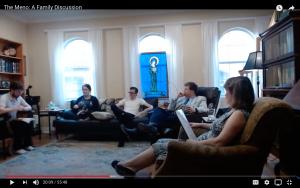
Hope told her daughters this: “Never marry an angry man or a man with an angry father.”
This advice has served my daughters well and reminds us that the vice of excessive anger is a terrible danger. Righteous anger is the appropriate response to injustice. The excess of anger becomes an injustice itself and consumes all around. The excessively angry man often sees every action that crosses his will as injustice, because he knows he is right. The angry man is ready with a rant since he sees through everyone and all of “it” is too much for him.
Education is no longer possible for the angry man, because he cannot dialogue. If he should learn from his wife, he will be too busy putting his wife down, yelling, stomping. He has disdain for expertise. . . to him it is all trickery meant to rip him off again. This very angry man will often rant against the “sophists,” by which he means anyone who questions his “simple” or “obvious” wisdom. Anger is the superpower he uses to maintain himself when combined with physical attractiveness, wealth, or social status. God help a culture when money, power, charisma, and anger are all combined in one man.
The sycophants will make excuses, the angry man will lash out at everyone in the family, the church, the organization, the state, and all genuine dialogue will die wherever he is. Some angry men are merely angry, but many have other attractive qualities that hide the consequences of their rage. Narcissus was attractive, especially to himself, and more than a few people will give the handsome, powerful, or rich narcissus power. Few things are a more sure sign of Narcissus in power than excessive, passionate anger. Such a man will even boast of his passion, retailing warnings by way of “war stories” about what happens when someone dares to cross Narcissus.
Plato warns us of this man, so outwardly attractive, seething with rage, in Meno. Socrates discusses whether virtue can be taught, pushes to discover the nature of virtue, with sophisticate named Meno. After a fruitless discussion, Meno will not ask a genuine question or give a real response, Anytus enters the discussion. He has no time for education, sees all of it as sophistry, and thinks any decent Athenian understands virtue. Sadly, he is the inferior, angry son to a better father. He is a living example that even good men with great resources cannot guarantee a good son no matter how hard they try.
Anytus tries out his favorite lines, the japes that make his friends laugh and congratulate him for his wit, on Socrates. When things do not go as well as they do with his sycophants, Anytus grow irritable and leaves. Before he does, however, Anytus warns Socrates to be careful:
You don’t seem to have any qualms about running people down, Socrates. If you want my advice, I’d recommend caution. You should appreciate that, as easy as it may be to do people harm or good elsewhere, here in Athens it’s particularly easy. But I think you’re already aware of this.*
Anytus, this angry man, will help convince Athens to kill Socrates.
The angry younger man is bad enough, but the embittered older man, someone who has retailed his rage until his looks fail so he can no longer easily gain a sympathetic audience, is worse. He will strike out at anyone unfortunate to get near his snark, his contempt, his rage that the cosmos has failed him. Everyone fails the angry old man in the end. He will maneuver and manipulate until any Socrates that dares oppose him is dead.
Righteous anger, godly wrath, can purify a nation. The excessively angry burn down everything to avoid any chance of knowing self. Self-knowledge, after all, might reveal his anger, his wrongness. In this pandemic time, beware anyone that cannot turn to minister to the hurting. This man may have cloaked his cause as righteous rage or a love of learning, but if he must continue to attack, attack, attack even when the world is gasping for air, then he is an angry man.
Withdraw from such a one and hope that he cannot, like Anytus, stir up a mob. Family, organization, or state, do not marry yourself to an angry man.
Lord Jesus Christ, son of God, have mercy on me a sinner.
———————————————————————-
*Waterfield, Robin. Meno and Other Dialogues: Charmides, Laches, Lysis, Meno (Oxford World’s Classics) (p. 135). Oxford University Press. Kindle Edition.











